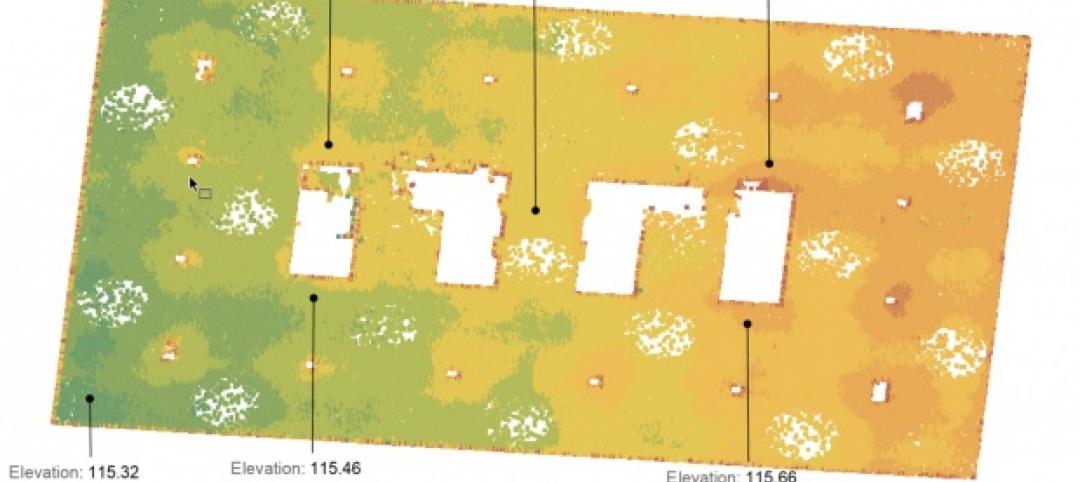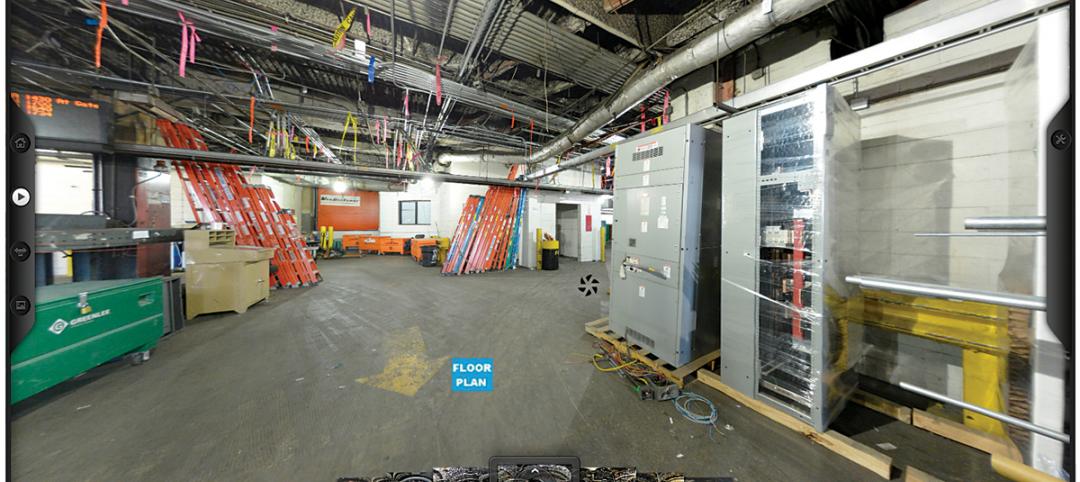
Collaboration software is going beyond just sharing files. It is being used to enable full building information modeling early in design. Two programs are enabling Building Teams to more easily share the information in BIM and use it for integrated project delivery: Bluebeam Software, which just released the newest version of its AEC-specific PDF collaboration tool; and eBuilder Enterprise, a Web-based capital project and program management tool used by owners and real estate professionals.
PDF Revu 8: beyond PDF markup to file management
Architects and contractors have been using paperless tools such as Bluebeam PDF Revu for much of the past decade. Over its first seven previous versions Bluebeam has evolved from a PDF creation tool born in the aerospace industry to one of the most popular PDF markup and revision tools in the AEC market.
The company's latest release, Bluebeam PDF Revu 8 (CAD edition), is moving beyond digitizing paper to full project collaboration and management. It features Microsoft SharePoint and Bentley ProjectWise integration and a new file manager that lets users search, “pin,” and integrate their documents with other users' systems. The new version also has a Revit plug-in that can integrate it with Revu.
“We don't speak in terms of being a PDF editor anymore,” Bluebeam CEO Richard Lee told me. “We're really focused on providing workflow and collaboration software. You will see in the future a lot of functionality and features designed around how people work. The fact that it is in PDF is just convenient.”

The most noticeable change in Revu 8 is a new “file access tab” on the left panel of the user interface. It allows mouse-over preview of any PDF and shows the location of the file, whether it's on your hard drive or in a shared project management program such as SharePoint. The access tab's history area gives a quick view of all of the PDF files you looked at recently.
“Users told us, 'I want to be able to get to the PDFs I work with quickly, whether they're on a SharePoint drive or on my machine,'” said Don Jacob, VP of engineering at Bluebeam. “Our mid-size to large AEC users want better integration.”
The SharePoint integration offers an easy connection to files in the document management platform. A new explorer panel, similar to Windows Explorer, is embedded in the file access tab in Revu 8. From that panel you can automatically navigate the SharePoint library and check files in and out without having to switch between Bluebeam and SharePoint.
You can also check version histories of files in the library from the explorer and “pin” them to projects and documents on your hard drive. The functionality seems to work similarly for ProjectWise, but I couldn't try that one out, as I was unable to obtain a review copy of ProjectWise.
The “pinning” feature, itself is a new addition that addresses a major pain point many architects and contractors have when managing project files: keeping them together and organized. With two mouse clicks you can pin any file and it will stay in your access tab (with a pushpin designating its file as such) with all of its history information available to you on mouse-over. You can pin files to a project or a group of projects.

The tool sets are also improved in Revu 8. Some of the new markup tools include representations of people (good for scale) and welding markups for fabrication drawings. The personal toolbar in Revu 8 is more customizable, too, allowing you to add any Revu 8 function to it. This is good for companies that use one toolbar layout for architects, a different one for engineers, and even more customized layouts for super-users.
Finally, one of the smallest but best additions to Revu 8 is hyperlinking within annotations for fabrication drawings. Many subcontractors and fabricators bemoan the lack of reference documentation in computer-generated shop drawings. How can you access “Appendix 6” when all you've been given is “page 300?” By adding actions to an annotation, anyone who has page 300 automatically also receives a hyperlink to Appendix 6 in Revu 8. In the war against paper-based workflows, it's the small victories such as this that will carry the day for paperless.
E-Builder: Integrated for project management
E-Builder Enterprise is a Web-based project and program management application that helps facility owners and operators—and the AEC companies that provide services to them—address the challenges associated with the planning, design, construction, and operation of complex capital projects.
E-Builder clients are primarily facility owners with ongoing capital programs (e.g., additions, renovations, new facilities), such as Inova Health System. All that users need to use the system is a browser, username, and password, and it can be accessed anywhere via the Web. Some of the core aspects of the system include cost control, schedule management, change management, and construction administration.
“The entire e-Builder system is SAS 70 Type II certified,” said Jonathan Antevy, CEO of e-Builder. “It's a significant on-going investment but it has become the standard that our clients demand of us.” Antevy says that his company has been developing Web based software-as-a-service (SaaS) since its founding in 1995. “Our business is not built for a specific platform like Windows or Mac,” he says. “It is built for the Internet.””=
Duke University Health System in Durham, N.C., is currently using eBuilder on the 600,000-sf, $559 million addition to the Duke Medicine Pavilion. The project, which started rolling in 2009, will add 160 critical care ICU stepdown beds and 16 new operating rooms to the pavilion. The addition has been designed to achieve LEED Silver certification.
“We did a one-way integration of all of the financial information for the project from our SAP system into e-Builder,” said Mark Greenspan, director of facility planning, design, and construction at Duke Medical Center. “Our accounting departments tracks overall costs in the SAP system, but our project managers needed that information at a more granular level. It was fairly simple to get that information imported from SAP into e-Builder in the format we could use.”
Another eBuilder project is the Advanced Health Sciences Pavilion at Cedars-Sinai Medical Center in Los Angeles, an 800,000-sf, $400 million new hospital that is integrating e-Builder's tools with the Solomon accounting system.
Project managers at Cedars-Sinai—which broke ground last summer and is expected to be completed in 2012—use e-Builder to check monthly audit reconciliations, as well as for budgeting, archival processing, and storage of construction documents and meeting minutes.
“We needed our information more directly available to us,” said Robert Cull, executive project director for facilities planning, design and construction at Cedars-Sinai.
Both of these projects are using BIM files cataloged in e-Builder Enterprise. E-Builder supports BIM review by allowing users to work with BIM files without third-party software via an integrated Autodesk Navisworks viewer. You can upload a BIM file into e-Builder published to the .NWD file format, which includes all loaded models, the scene's environment, the current view, and favorite viewpoints, so that you can view the file and its animation without Navisworks or another translator.
“The changes that someone on a project makes cause other changes that we can control and automate with our process and workflow tools, ” Antevy said. “We give our clients the ability to focus on process instead of technology.”
Related Stories
Green | Jun 8, 2015
Diamond Schmitt Architects creates tool to compare energy use data across building types
The firm's new ecoMetrics tool allows for a comprehensive analysis of data from energy simulation models across a wide range of the company’s building types.
BIM and Information Technology | Jun 5, 2015
Backpack becomes industry first in wearable reality capture
Combining five high-dynamic cameras and a LiDAR profiler, Leica's Pegasus:Backpack creates a 3D view indoors or outdoors for engineering or professional documentation creation.
BIM and Information Technology | Jun 4, 2015
Why reality capture is essential for retrofits
Although we rely upon as-built drawings to help us understand the site for our design, their support is as thin as the paper they are printed on, write CASE's Matthew Nelson and Carrie Schulz.
BIM and Information Technology | Jun 3, 2015
More accurate GPS ready to change the way we shop, interact, and explore
New technology reduces location errors from the size of a car to the size of a nickel—a 100 times increase in accuracy. This is a major technological breakthrough that will affect how we interact with environments, the places we shop, and entertainment venues.
Sponsored | BIM and Information Technology | May 28, 2015
Does BIM Work as a Deliverable?
Sasha Reed sits down with industry professionals at the BIMForum in San Diego to talk about BIM technology.
BIM and Information Technology | May 27, 2015
4 projects honored with AIA TAP Innovation Awards for excellence in BIM and project delivery
Morphosis Architects' Emerson College building in Los Angeles and the University of Delaware’s ISE Lab are among the projects honored by AIA for their use of BIM/VDC tools.
BIM and Information Technology | May 26, 2015
Lego-like model building kit was created by an architect for architects
Arckit, as the system is called, was designed to a 1:48 scale, making it easy to create models accurate to the real-life, physical building projected.
BIM and Information Technology | May 26, 2015
Moore's Law and the future of urban design
SmithGroupJJR's Stephen Conschafter, urban designer and planner, discusses his thoughts on the 50th anniversary of Moore's Law and how technology is transforming urban design.
BIM and Information Technology | May 21, 2015
How AEC firms should approach BIM training
CASE Founding Partner Steve Sanderson talks about the current state of software training in the AEC industry and common pitfalls in AEC training.
BIM and Information Technology | May 13, 2015
5 smart tech trends transforming the job site
RFID labor tracking, 360 cameras, and advanced video tools are among the tech innovations that show promise for the commercial construction industry.
















